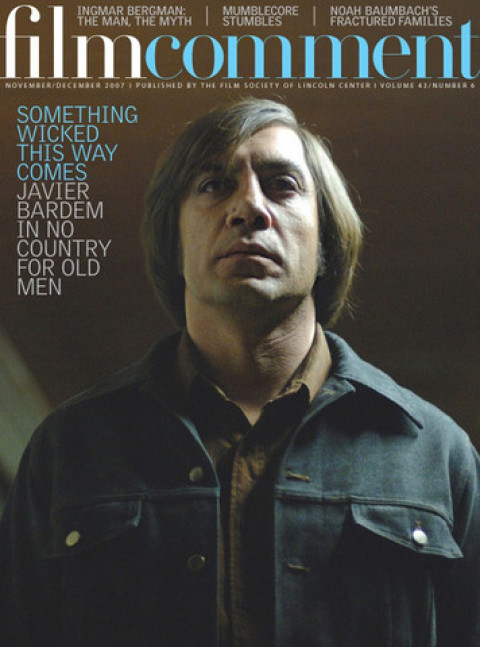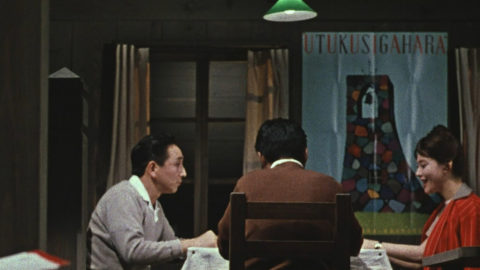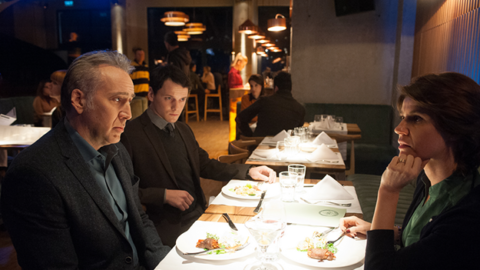
Hardcore auteurists are predisposed to love or at least like Paul Schrader, whose obsessions can be traced—obsessively, even—through his work as critic, scholar, screenwriter, director, and, in Film Comment a year ago, canonist (“Canon Fodder,” Sept/Oct 06). Whatever else that essay’s straight-arrow shot to the heart of “special causes” did for his reputation as cinephilia’s master-stroker, it sports elements conducive to appreciation of Schrader’s new and highly familiar film The Walker: chiefly, his pledge to “ride the broken-down horse called movies into the cinematic sunset”; and his appropriation of Harold Bloom’s term “strangeness” to describe that which matters more to the canonist than originality. Named for its rusting Car (Woody Harrelson), a middle-aged gay man who chauffeurs and otherwise escorts wealthy women through D.C. society, The Walker is a well-lubed vehicle for Schrader’s own sunset cruise, taking as it does from American Gigolo’s own pilfering of Pickpocket (#4 in the Schrader canon). Original, no. But this movie’s strangeness is in full bloom.
That Harrelson, despite a thin mustache, pinkie ring, and lilting drawl, makes a less than convincing ol’ Suthun queer hardly hinders Schrader’s latest study of identity unforged. By day, Car—short for Carter Page III—plays canasta and exchanges lewd gossip with a rarefied set of politicians’ wives (Lauren Bacall, Lily Tomlin, Kristin Scott Thomas, Mary Beth Hurt); by night, he awkwardly tries to hold the gaze of photographer Emek (Moritz Bleibtreu), who’s half his age. Car isn’t exactly in the closet, but he stubbornly refuses to integrate the halves of his double life, particularly once the lobbyist with whom Thomas’s Lynn Lockner was trysting turns up stabbed to death, and the walker becomes a suspect.

Like Gigolo, The Walker subordinates its murder mystery to the slow revelation of the protagonist’s psychology and works most poignantly as a study of the fragile means by which an isolated underachiever keeps himself together. As before, Schrader’s sliding camera fetishizes the fabric—including Car’s compulsively arranged collection of neckties—while revealing its thinness, how the clothes can never fully protect a narcissist from the elements. (Each film finds its character at his lowest point when his perfectly art-directed inner sanctum has been trashed.) The humiliations of a life spent satisfying rich women steer Car, like the gigolo, away from his chosen profession—although, in terms of Schrader’s career, I’d guess or at least hope we haven’t seen the last of the auteur’s hot-cold bourgeois melodramas. (Letter from an Unknown Woman came in at #48.)
Old as the movie brats have become (a hard fact poetically reflected in the image of Car removing his hairpiece at day’s end), the filial relationship naturally remains vital to their cinema of guilt-ridden homage. The walker’s eventual acceptance of his inferiority to his congressman father, Carter Page II, reads as Schrader’s recognition that Taxi Driver (#36)—credited to director Martin Scorsese—is the closest the filmmaker will come to the canonist’s golden oldies. Accordingly, The Walker’s style isn’t as toned (or transcendental) as that of Gigolo (pimped by Giorgio Moroder and Ferdinando Scarfiotti), but the film builds handsomely to a scene whose poetry rhymes with Schrader’s 1972 reading of Pickpocket’s denouement: “the expression of love by an unfeeling man within an unfeeling environment.” Albeit borrowed, The Walker is nothing if not a personal expression.







